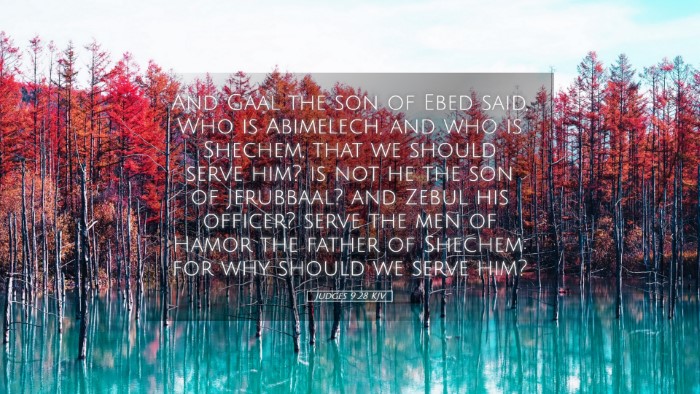Commentary on Judges 9:28
Judges 9:28 states:
"And Gaal the son of Ebed said, Who is Abimelech, and who is Shechem, that we should serve him? is not he the son of Jerubbaal? and Zebul his officer; serve the men of Hamor the father of Shechem: for why should we serve him?"
Contextual Analysis
The narrative in Judges 9 centers around the tumultuous leadership of Abimelech, the son of Gideon (Jerubbaal). After the death of Gideon, Abimelech sought power over Israel, which led to stratagems and betrayals. This verse occurs during a pivotal moment when Gaal challenges Abimelech’s rule, reflecting the broader themes of loyalty, political ambition, and the cycle of Israel's leadership.
The Character of Gaal
Gaal’s challenge to Abimelech serves multiple purposes:
- Assertion of Identity: Gaal questions the legitimacy of Abimelech’s authority. By asking "Who is Abimelech?", he undermines his position and appeals to the identity of the people of Shechem.
- Echoes of Rebellion: His words resonate with the sentiments of rebellion. Gaal does not merely question Abimelech but also suggests an alternative allegiance to Hamor.
The Theological Implications
This moment indicates a broader theological theme within Judges: the struggle for leadership in a theocratic society where God’s will is often obscured by human ambition.
- Divine Sovereignty vs. Human Authority: Gaal’s rejection of Abimelech represents a common biblical motif: the tension between God’s chosen leaders and the choices of the people.
- Idolatry of Power: Gaal’s intentions raise questions about who the people ultimately serve. This reflects the recurring biblical narrative about the dangers of idolatry, not just of physical idols but of power and authority.
Insights from Commentators
Commentators such as Matthew Henry, Albert Barnes, and Adam Clarke provide deep insights into the implications of this verse.
Matthew Henry
Henry emphasizes the foolishness of rebellion and the consequences that arise from challenging divinely appointed leaders. He notes that Gaal's speech highlights not just personal ambition but a larger inclination among the people to favor leadership that resonates with their immediate concerns rather than adheres to God’s order.
Albert Barnes
Barnes offers insights into the political dynamics of the time, noting that Gaal’s rhetoric is a strategic manipulation of local sentiments. He asserts that Gaal’s challenge is indicative of political instability and hints at the fragility of Abimelech’s rule, pointing to the idea that governance is often contested and can reflect deeper issues of identity and loyalty within a community.
Adam Clarke
Clarke expands on the historical context of the verse, suggesting that this conflict represents not only a personal rivalry but a reflection of Israel’s ongoing struggles with leadership and identity post-Gideon. He also notes the implications for how communities respond to leaders and the potential for discord when citizens feel disenfranchised.
Application for Contemporary Readers
Judges 9:28 offers profound application for modern readers:
- Critical Engagement: This passage encourages leaders and congregants alike to engage critically with those in power, advocating for accountability and adherence to divine principles.
- Awareness of Ambition: It serves as a reminder of the dangers of ambition without godly oversight and the potential for leaders to manipulate allegiances for personal gain.
- Community Identity: Believers are urged to self-reflect on whom they serve and to ensure that their loyalties align with God’s calling rather than mere human leaders.
Conclusion
Judges 9:28 highlights the complexity of power dynamics within the faith community and serves as a warning against the dangers of ambition and idolatry of power. As educators, pastors, and scholars reflect on this passage, they are called to consider the deeper implications of leadership within the church and society, recognizing the need for ethical governance that aligns with divine principles.


